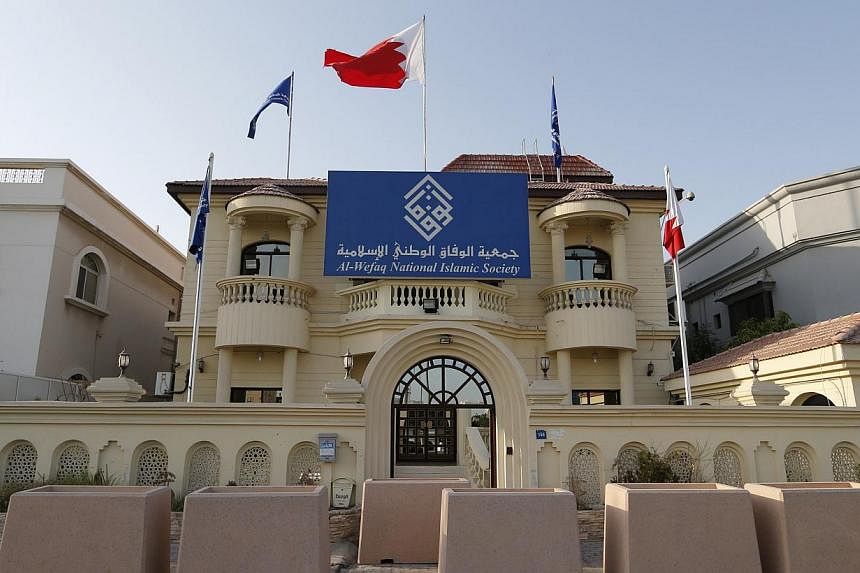DUBAI (AFP) - A Bahraini court banned the main opposition Al-Wefaq movement for three months on Tuesday, just weeks before a parliamentary election the group had already said it would boycott.
Al-Wefaq, which draws most of its support from the Shiite majority in the Sunni-ruled nation, described the ruling as "irrational and irresponsible".
The United States, a key ally of the strategic kingdom just across the Gulf from Iran, expressed concern, saying "such a move runs contrary to fostering an environment of political inclusion".
In its ruling, the Manama administrative court said Al-Wefaq had violated the law on associations, according to a court official.
Political parties are banned in Bahrain, as in other Gulf Arab monarchies. Al-Wefaq has the status of an association.
In July, the justice ministry sued Al-Wefaq, demanding it rectify its "illegal status following the annulment of four general assemblies for lack of a quorum and the non-commitment to the public and transparency requirements for holding them".
The court gave the group three months to hold an assembly to elect its leaders, the official said.
Without commenting on the accusations, Al-Wefaq said "the tyrannical dictatorship in Bahrain is ruling with an iron fist and moving to destroy the political and social life by blocking the people out."
Other opposition groups have also announced they will boycott the November 22 election.
In July, Bahrain's chief prosecutor tested ties with Washington when he charged Al-Wefaq head Ali Salman, and his political aide, ex-MP Khalil Marzooq, with violating a law on foreign contacts by meeting US Assistant Secretary of State for Democracy, Human Rights and Labour Tom Malinowski.
Following the meeting, Bahrain told Malinowski he was "unwelcome" and said he should leave the country "immediately".
Elections for a new 40-seat lower house of parliament are the first since 2011 protests demanding more representative democracy. Municipal elections will be held simultaneously.
Al-Wefaq, which led the protest movement against the Sunni regime, made slender gains in the last election, in 2010. But it withdrew its 18 MPs after the government crushed the protests in March 2011.
The opposition is demanding an independent electoral commission and the dissolution of the Consultative Council, parliament's upper chamber whose members are appointed by the king.
It is also demanding the prime minister be appointed by parliamentary majority, instead of the king.
Bahrain accuses Al-Wefaq of fuelling unrest, as people in Shiite villages hold frequent protests and sometimes clash with the security forces, but Al-Wefaq insists on the "peaceful" nature of its movement.
Tensions are running high, with the pre-election campaign marked by sporadic acts of violence and the authorities accusing dissidents of attacking candidates.
And government spokeswoman Sameera Rajab wrote Friday on Twitter that "elections in Bahrain are facing organised terrorism".
But no major incidents or casualties have been reported.
The opposition took part in two rounds of dialogue after the month-long uprising that was brutally crushed in 2011 but withdrew, saying the authorities were not making enough concessions.
New York-based Human Rights First warned Tuesday's decision could "lead to more friction and instability in the country as it prepares for parliamentary elections".
Its director Brian Dooley said: "With less than four weeks until Bahrain's parliamentary elections, the decision to suspend Al-Wefaq looks far from coincidental."
Al-Wefaq vowed to "continue in its struggle for democratic transition and justice to... end the totalitarian rule that is excluding the people through harsh sentences and security measures that violate fundamental human rights." Separately on Tuesday, a Manama criminal court ordered the deportation of 10 Shiites for "violating the kingdom's residency law", a judicial source said.
The 10 were among 31 Shiites whose citizenships had been revoked in 2012 for having "undermined state security".
The ruling comes despite watchdog calls for the scrapping of laws allowing the citizenship of dissidents to be revoked.
The International Federation for Human Rights says at least 89 people have been killed in Bahrain since the uprising began in February 2011.

